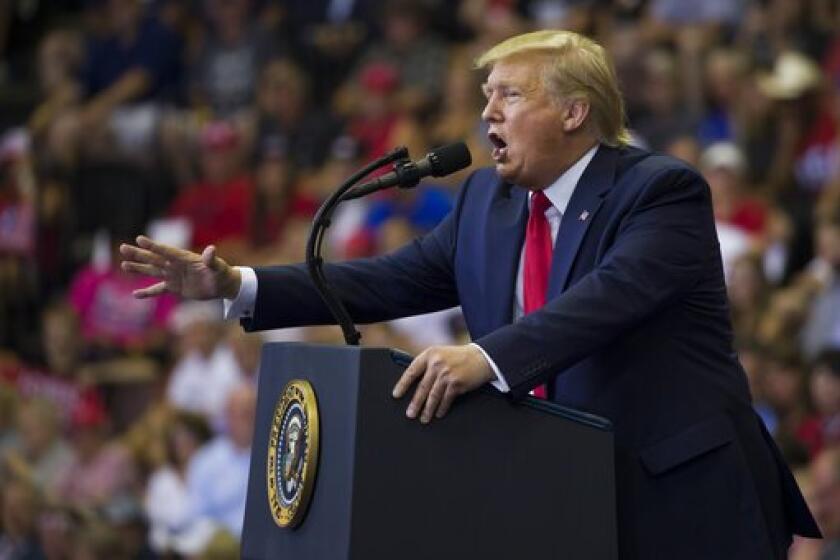If It’s Bribery We’re After, There Ought to Be a Law
- Share via
First enacted in 1872, the mail-fraud statute has been used more and more during the last 20 years not only for its original purpose--to prosecute schemes in which persons are defrauded of their money or property--but also as a weapon against corrupt state and local government officials. It came as a surprise, therefore, when the U.S. Supreme Court in its recent decision, McNally vs. United States, rejected the prevailing interpretation--supported by numerous lower-court decisions--that public officials committed mail fraud if they employed the mails in accepting a bribe or illegally using their official position to make a personal profit.
Instead, the court ruled that in a mail-fraud prosecution the government must prove the traditional element of a “fraud”--a loss of money or property by the victim. It was not enough that the public had been defrauded of its right to the honest services of government officials if no monetary loss had resulted.
The decision in McNally will in some cases affect whether the statute can be used against public officials. Government lawyers were shocked. Defense attorneys were elated. The result was particularly startling because, in recent decades, the court has generally been giving broad constructions to federal criminal statutes. Justice John Paul Stevens in dissent, as well as a high Justice Department official, suggested the possibility for congressional action to amend the statute.
How significant is the McNally decision? Is new legislation really needed?
In McNally, the defendants had been responsible for the award of a contract to an insurance agent to obtain insurance for the state and made it a condition that part of the commissions paid to that agent be shared with insurance agencies controlled by the defendants. The gist of the fraud alleged was that the defendants did not disclose their financial interest in the award of the contract, but the court noted that the commissions were not the state’s money and that no state law prohibited a state officer from having an ownership interest in an insurance agency handling the state’s insurance.
Government attorneys will argue that requiring them to prove in such cases that the public suffered a loss puts an intolerable burden on them and makes this kind of use of the mail-fraud statute essentially a dead letter. I am not so sure. It might be possible to prove in a case like McNally that in the absence of the scheme the state would have obtained a lower premium or secured better insurance.
There is a hidden “states’ rights” issue lurking in the McNally decision. If the federal government cannot use a mailfraud charge in a political-corruption case because it cannot prove monetary loss, it will in many cases be able to invoke the federal Travel Act, which makes it an offense to travel interstate or use a “facility” in interstate commerce (for example, an interstate telephone call) in aid of certain crimes. However, the Travel Act makes the question of whether a federal crime has been committed in a bribery or extortion case turn on whether that conduct is a crime under the criminal law of the state. Defendants in mail-fraud prosecutions often complain, to no avail, that their conduct was not a crime under state law. Under the Travel Act, that kind of claim can succeed.
Application of the criminal law to persons involved in politics and government raises a perplexing issue. What kind of favors or benefits should an official be able to receive without committing a crime? One of the defendants in the McNally case claimed that what he had done “was totally legal. It’s been done for years . . . . (It’s) patronage.”
There is something very odd about using a crime category like fraud as a kind of catchall, to prosecute conduct that involves some other offense. To the extent that McNally discourages the use of the mail-fraud statute for prosecuting conduct that really involves other crimes like bribery, extortion and blackmail, and forces federal prosecutors to use statutes that expressly address such conduct, the decision will have a desirable effect.
Federal prosecution of state and local corruption will not stop as a result of the McNally decision. However, if government lawyers really believe that legislation is needed, they should propose a bill that expressly makes the bribery of state and local officials or the misuse of their official positions for private gain a federal crime rather than trying to use a vague concept of “fraud” to prosecute all sorts of crimes. The hardest question facing those who would legislate on this subject is whether to make the commission of the federal crime turn on the fact that state law has been violated or whether to adopt an independent federal standard as to what constitutes criminally corrupt behavior by state and local officials. States’-righters would probably prefer to leave any federal enforcement dependent on whether a crime has been committed under state law. In the final analysis, however, the issue should turn on whether we believe that there should be a national standard for unacceptable political and governmental behavior in this country.
More to Read
Get the L.A. Times Politics newsletter
Deeply reported insights into legislation, politics and policy from Sacramento, Washington and beyond. In your inbox twice per week.
You may occasionally receive promotional content from the Los Angeles Times.










